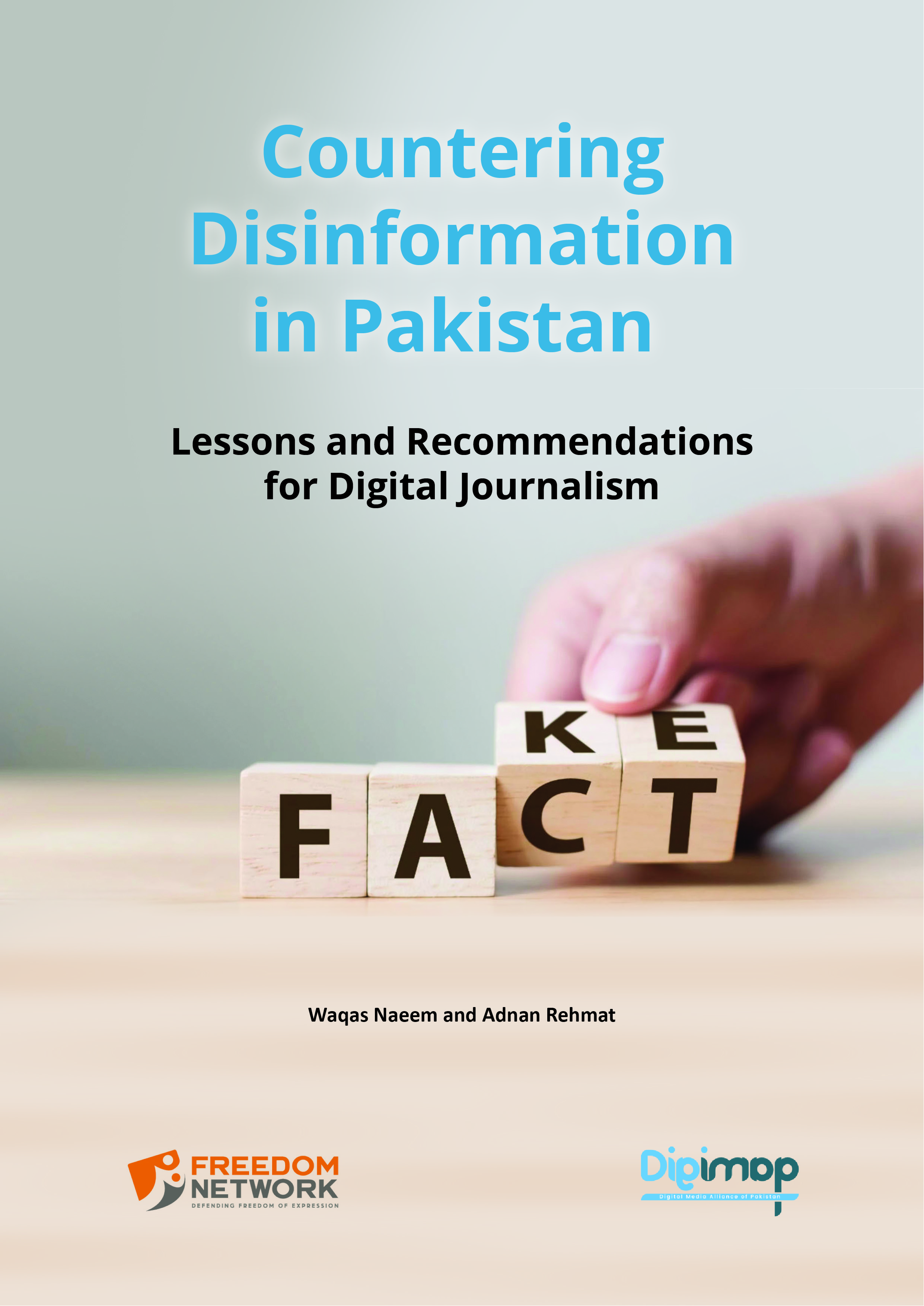ISLAMABAD, 13 December 2022 – Media and civil society responses to countering disinformation in Pakistan have seen limited success in the face of conceptual, technical, and financial challenges, according to a new research study.
The study, titled “Countering Disinformation in Pakistan: Lessons and Recommendations for Digital Journalism”, was published by Freedom Network, a civil liberties organization that monitors press freedom, and the Digital Media Alliance of Pakistan (DigiMAP), a collective of independent online news organizations.
The research also confirms that Pakistani journalists are negatively affected by online disinformation. The negative impact includes the potential physical, psychological and reputational harm caused to women journalists who are disproportionately targeted with gendered disinformation campaigns online.
The study was conducted to derive lessons from past and existing initiatives in the country to combat disinformation and provide evidence-based recommendations for future action.
Iqbal Khattak, the Executive Director of Freedom Network, said disinformation has created severe risks for Pakistan’s society, democracy, and news industry.
“Online disinformation in its various forms has affected almost all areas of public life in Pakistan,” Khattak said. “There have been commendable efforts by civil society and journalism support groups to reduce the spread of disinformation, but we need to have an informed joint strategy to counter disinformation.”
He said the research study provides a roadmap for collaborative responses to fighting the menace of false content and helping the public access credible news and information.
Sabookh Syed, the President of DigiMAP and founder of online news website IBC, said digital journalists and independent digital news outlets have a key role in the efforts to counter disinformation.
“As Pakistan gears for general elections next year, we expect the online disinformation campaigns to intensify,” Syed said. “Digital journalists must anticipate the public’s need for accurate, timely, and verified information about current affairs in these circumstances.”
He said the report provides important suggestions for media and journalism support organizations to protect the public from disinformation in the Pakistani context.
The research examines non-governmental disinformation responses from the perspective of journalism, specifically digital news media. It uses a comprehensive literature review to discuss the nature of disinformation in Pakistan, its perceived impact on citizens and journalists, and the past and ongoing efforts to counter disinformation in the country undertaken by academia, media development organizations, news media, Big Tech, and fact-checking organizations.
Primary research for the report relies on key informant interviews with individuals working on local disinformation responses and an online survey of Pakistani digital journalists about their needs related to countering disinformation.
The study’s findings suggest that journalistic and fact-checking responses to counter disinformation in Pakistan have struggled due to the lack of conceptual understanding of disinformation among journalists, monetization trends that incentivize sensationalist news over accuracy, structural issues in the news industry that reduce impact of capacity building initiatives, lack of financial sustainability of responses, and language barriers.
At the same time, the research finds that local capacity building responses have improved the ability of individual journalists to understand Covid-19 misinformation and social media manipulation whereas fact-checking responses have led to the development of efficient workflows, informed recruitment principles, contextual verification practices, and collaboration with social networks to downrank viral online disinformation.
The study also confirms previous research findings that disinformation is threatening the work and safety environment of Pakistani digital journalists. Around 60% of the journalists surveyed for the research said disinformation has increased their risk of getting deceived by fake social media posts during online newsgathering.
In addition, most women journalists (56%) surveyed for the study said they were targeted with gendered disinformation campaigns, which caused them physical, psychological or reputational harm. A majority of surveyed women digital journalists (89%) also believed that they face additional challenges to counter disinformation due to their gender identity.
Over two-thirds of the digital journalists who participated in the survey identified fact-checking training as their most urgent need to counter disinformation.
The study offers recommendations for countering disinformation in Pakistan in the following four areas: fact-checking (including suggestions related to organizational, financial, and technical aspects of running a fact-checking organization), capacity-building training (including advice on training design and follow-up mechanisms), media and information literacy (including tips about educational interventions and awareness campaigns), and coalition-building (including guidance on developing multi-stakeholder consensus on the strategy to counter disinformation).

